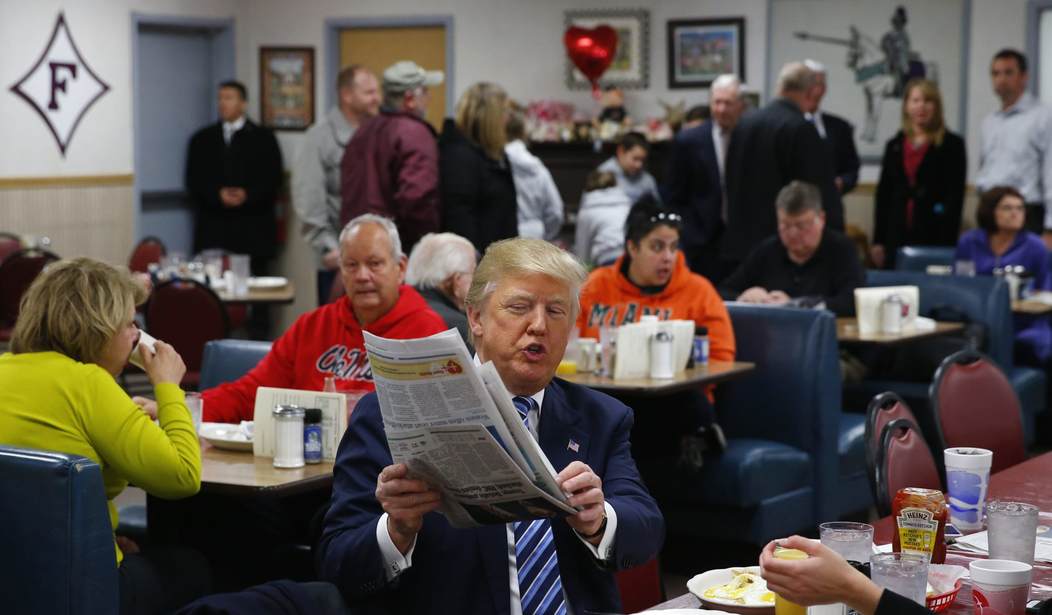WASHINGTON – Washington Post Executive Editor Marty Baron said President Trump declared war on the press but the media is not at war with him, despite the “hostile” environment that’s been created.
“The president on his first day in office went to the CIA headquarters and he said, I have a war with the press. The reality is we don’t have a war with him: we are not at war, we are at work. We are doing our jobs every day the same way we have always done it. You talk about fact-checking; we’ve had a fact-checker at the Washington Post for a long time, well before the Trump administration. In fact, we doubled the size. We added an extra person,” Baron said during a discussion at the National Press Club moderated by former CBS correspondent Marvin Kalb on Monday evening.
“We have two people now doing it, and they have been doing fact-checks for a long time. They happen to be a little busier these days than they were in the past, I have to say, but they are doing the same sort of work every single day,” he added. “The very fact that the president is attacking us does not change things. We cannot just be reactive to that; we have to go out, gather the facts, provide the context and do it in an honorable and honest way, and that is what we endeavor to do every single day.”
At the CIA in January, Trump said, “I have a running war with the media. They are among the most dishonest human beings on Earth.”
Dean Baquet, executive editor of the New York Times, said political journalists have to report “aggressively” and lay out the facts when the president says something wrong.
“I actually chose to use the word ‘lie’ on the front page of the New York Times, which was a controversial decision. And I think a lot of thoughtful editors would disagree with it, but we do not do it all the time – we did it that one time. I think the way that you cover him is, if he says ‘x’ and it is wrong, you report out why,” he said. “I think you report aggressively and I think you sort of lay out the facts. I think that is what we have been doing since I started as a reporter in 1977. I do not think it’s different; I think it’s faster, I think it’s even more aggressive.”
Kalb asked both Baron and Baquet to describe what’s different about covering Trump compared to past presidents.
“It’s is a more hostile environment, there is no question about that. He was attacking us during the campaign regularly, even withdrew credentials from the Washington Post during the primary and for a time during the general election as well,” Baron replied. “So this is what is different: it is a more threatening and hostile environment.”
Baquet agreed with Baron and added that Trump has “dramatically” changed the culture in Washington.
“There has always been a tense relationship. I was the Washington bureau chief of the New York Times for five years and I never met Barack Obama the entire time I was the Washington bureau chief. There was a notion that papers like the post and the New York Times had a cozy relationship. I don’t actually want to have a cozy relationship with any president. I don’t go to the Christmas parties. I don’t go to the White House Correspondents’ Dinner,” he said.
“But he’s turned up the volume, there is no question, and dramatically changed the culture of Washington. I know that this is not the sexiest answer, but I actually think that it calls for us to stick to our principles even more. It calls for us to hold on to the values, the fairness and the toughness,” the NYT editor added. “There are these traditional journalism standards that I think have been threatened by some institutions in the digital age, even before the arrival of Donald Trump. I think the last year has been a call to hold onto those and to hold onto them tightly.”
Baquet was asked if he thinks Project Veritas founder James O’Keefe’s videos are considered investigative journalism.
“I think his work is not investigative journalism,” said Baquet. “A journalist has to have in his heart or her heart a desire to make society better. All James O’Keefe is trying to do is hurt institutions and get some clicks. He just did a video about it that I think — and I used the word before, I’ll use it again — was despicable.”
Baquet described O’Keefe’s recent video involving a New York Times staff member as “dishonest” and “destructive.”
“He managed to trick a very young employee of the video unit of the New York Times into saying some outlandish things because he was a young guy who wanted to have a conversation with a woman. He said he was Jim Comey’s godson. He said he was the gatekeeper of video at the New York Times. He made all kinds of outlandish claims. He was a kid,” Baquet said.
“What James O’Keefe did in jeopardizing that kid’s career was awful,” he added. “I do not think it is journalism. It was destructive, it’s dishonest, his employees lied about who they were. No, I do not think that’s journalism. Journalism has got to have some value at its core. Some desire to make society better or better informed, and that’s not that.”









Join the conversation as a VIP Member